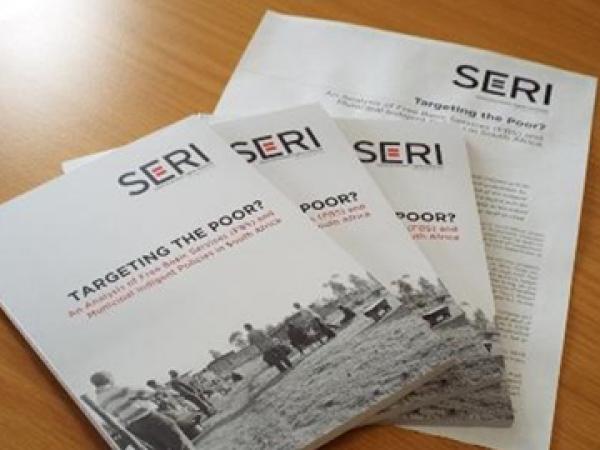

SERI’s report analysing the provision of free basic services by municipalities. Photo by Koketso Moeti.
26 May 2014
Many poor communities are still not getting adequate access to free basic services. This is despite the government’s set of policies aimed at helping municipalities to provide these services.
The state’s policy framework allows for the provision of free basic water, sanitation, energy and refuse removal to households without the financial means to access these services.
However, a report by the Socio-Economic Rights Institute of South Africa (SERI) shows evidence that poor communities are not getting adequate benefit of free basic services.
Between 1993 and 2011, there has been substantial growth in the number of people able to access free basic services, but SERI analysis of the data shows that this is still far below what it should be.
According to the organisation’s Senior Researcher, Kate Tissington, because each municipality develops its own policy there is no central place where they can be accessed. “After a huge struggle, we eventually got indigent policies from 137 municipalities in nine provinces and it is from this information that the report is based.”
Some of the hindrances to adequate provision of free basic services described in the report are:
The policies are often more concerned with eliminating fraud than with making sure that basic services get to those most in need.
Many municipalities publish the names of recipients for public comment. SERI suggests this is an outdated approach to poverty, which sees the poor as recipients of charity rather than people with rights.
Some of the conditions for receiving free basic services are problematic. For example, applicants must own the property where the services are provided. The implication is that the most vulnerable households who do not own property are excluded.
The requirements for a family to get free basic services are cumbersome. For example, a social worker must visit the family and then a ward councillor must approve the provision of services.
While municipalities do receive grants to fund free basic services, it is an unconditional grant. This means municipalities can spend it as they see fit and there is very little accountability. The report also highlights the lack of monitoring and regulation by the Department of Cooperative Governance and Traditional Affairs.
Stuart Wilson, the executive director of SERI, said, “Municipalities lack the will to drive true social and economic transformation which is reflected in the way [free basic services] are provided.” He argues that municipalities should rather be overgenerous to make sure people in need are not left out.